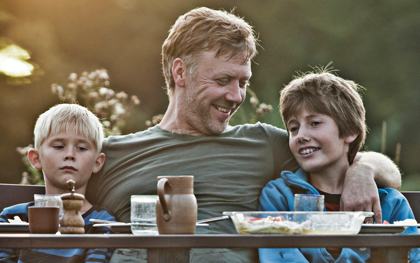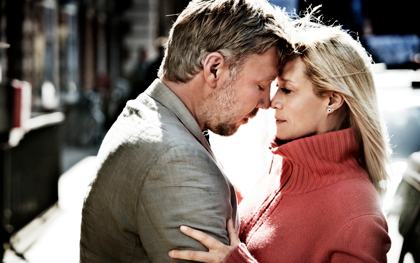Primary navigation

Denmark/Sweden/Norway 2010

Reviewed by Lisa Mullen
Our synopses give away the plot in full, including surprise twists.
Africa, London and Denmark, present day. While heroic doctor Anton saves lives in an African refugee camp, at home in Denmark his son Elias struggles with school bullies and his parents’ divorce. Elias’s life seems to take a turn for the better when a new boy, Christian, arrives in his class. Christian has been living in England but has returned home with his father Claus following the death of his mother. Icily composed, Christian takes on the bullies with a knife, and makes Elias complicit in covering up his actions; the two are bonded by their secret.
Returning from Africa, Anton is involved in a confrontation with an abusive stranger; he tries to defuse the incident with reasoned argument. Christian is contemptuous of this approach and encourages Elias to take revenge on his father’s behalf. The boys make a bomb to blow up the man’s car; with the fuse lit, Elias sees a woman and child close by. He rushes to save them and is badly injured. Believing that he has killed Elias, Christian tries to throw himself off a high tower, but is saved by his father.
Since winning this year’s Academy Award for best foreign-language film, In a Better World has been greeted with a degree of bemusement by critics in the US, who acknowledge its gorgeous cinematography and impressive performances but tend to tut over its apparently glib morality. And they may have a point: the film begins by studiously parallelling the work of saintly Danish doctor Anton (Mikael Persbrandt), sticking people back together in an African war zone, and the plight of his son Elias (Markus Rygaard), facing the mindless brutality of the schoolyard. The message seems to be simple: Violence Is Bad. Likewise, the film ends with an act of revenge that yields devastating unintended consequences: Revenge Is Bad. So is this a beautifully acted, beautifully photographed sermon? Well, no. Because in between these monochromatic ethical anchors, morality shifts and heaves. Like the sea Anton and his son spend a lot of time gazing at, it never quite comes to rest.
There’s a gremlin in the clockwork goodness machinery, and his name (not unironically) is Christian. Played with chillingly deadpan certainty by William Jøhnk Juel Nielsen, he is first seen calmly reading a poem at his mother’s funeral and shrugging off his father’s attempts to talk about grief. He’s absolutely fine, which is of course exactly what’s wrong with him: he crackles with repressed emotion and focuses the film’s sense of impending, ineluctable doom. Like a latterday Holden Caulfield, Christian cuts through the pointless wittering of the adults around him, but we get a shocking awakening when he takes on the bully who has been making Elias’s life a misery and now wants to add Christian to his hit list: in the first real act of violence in a film that has so far only spilt theoretical blood, Christian beats him viciously with a bicycle pump before pulling a knife and threatening to kill him. Sweet, goofy, friendless Elias is hooked: a mixture of adoration and fear now binds him to the most dangerous character in the film.

Set against Christian’s conviction that right and wrong boil down to might is right is Anton’s equally uninflected assumption that all you need is love. In Africa, faced with the question of whether he should save the life of a warlord who carves up pregnant women for fun, he treats his wounds without question. Back in Denmark, he gets a slap from a thuggish car mechanic and tries to use the incident to teach Elias and Christian the value of turning the other cheek – and finds that his good intentions have precipitated the film’s perilous denouement. His supposedly unimpeachable virtue is gradually revealed as something close to vanity, but he needs to maintain the fiction that life’s hard questions can be solved by an easy aphorism, if only to avoid thinking about his own frailty – his lack of connection with the son distanced by a dodgy Skype line to Africa; his betrayal of his estranged wife. It’s not just Christian’s promise of protection that draws Elias to him: the perennial victim has learnt the hard way that his parents’ cosy non-violence doesn’t work in real life. Christian’s solutions are swift, sure and satisfying; and what’s more, there’s nothing remotely phoney about them.
Is this the point then? Sure, by the time the credits roll we have been reassured that most things can be sorted out with a hug and a chat, but the moments that linger in the mind all come from scenes of rage and grief and wild abandon. If this really is supposed to be a film with a pat moral message, then director Susanne Bier has messed up somewhere. More interesting to see it as an attempt – suggested by its original Danish title, which means ‘Revenge’ – to grapple with the nuances of good and evil and examine the limitations of virtue in the face of pure emotion.
The Girl with the Dragon Tattoo reviewed by Lisa Mullen (April 2010)
Bleeder reviewed by Chris Darke (April 2000)
Show Me Love reviewed by Liese Spencer (March 2000)
Festen reviewed by Peter Matthews (March 1999)